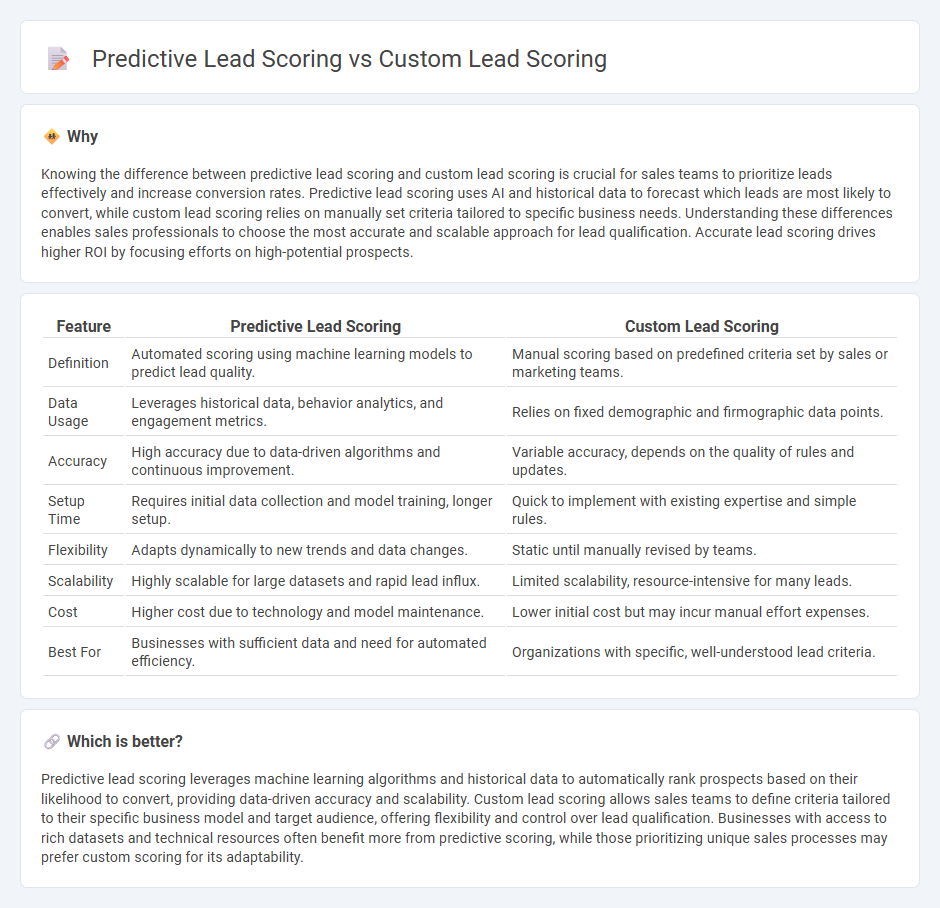
Predictive lead scoring uses machine learning algorithms to analyze historical data and identify patterns that indicate high-quality leads, improving sales efficiency and accuracy. Custom lead scoring allows businesses to tailor scoring criteria based on unique sales processes and priorities, creating a more personalized approach to lead qualification. Explore the key differences between predictive and custom lead scoring to enhance your sales strategy.
Why it is important
Knowing the difference between predictive lead scoring and custom lead scoring is crucial for sales teams to prioritize leads effectively and increase conversion rates. Predictive lead scoring uses AI and historical data to forecast which leads are most likely to convert, while custom lead scoring relies on manually set criteria tailored to specific business needs. Understanding these differences enables sales professionals to choose the most accurate and scalable approach for lead qualification. Accurate lead scoring drives higher ROI by focusing efforts on high-potential prospects.
Comparison Table
| Feature | Predictive Lead Scoring | Custom Lead Scoring |
|---|---|---|
| Definition | Automated scoring using machine learning models to predict lead quality. | Manual scoring based on predefined criteria set by sales or marketing teams. |
| Data Usage | Leverages historical data, behavior analytics, and engagement metrics. | Relies on fixed demographic and firmographic data points. |
| Accuracy | High accuracy due to data-driven algorithms and continuous improvement. | Variable accuracy, depends on the quality of rules and updates. |
| Setup Time | Requires initial data collection and model training, longer setup. | Quick to implement with existing expertise and simple rules. |
| Flexibility | Adapts dynamically to new trends and data changes. | Static until manually revised by teams. |
| Scalability | Highly scalable for large datasets and rapid lead influx. | Limited scalability, resource-intensive for many leads. |
| Cost | Higher cost due to technology and model maintenance. | Lower initial cost but may incur manual effort expenses. |
| Best For | Businesses with sufficient data and need for automated efficiency. | Organizations with specific, well-understood lead criteria. |
Which is better?
Predictive lead scoring leverages machine learning algorithms and historical data to automatically rank prospects based on their likelihood to convert, providing data-driven accuracy and scalability. Custom lead scoring allows sales teams to define criteria tailored to their specific business model and target audience, offering flexibility and control over lead qualification. Businesses with access to rich datasets and technical resources often benefit more from predictive scoring, while those prioritizing unique sales processes may prefer custom scoring for its adaptability.
Connection
Predictive lead scoring and custom lead scoring enhance sales efficiency by prioritizing prospects based on data-driven insights and tailored criteria, respectively. Predictive lead scoring uses machine learning algorithms to analyze historical data and forecast a lead's likelihood to convert, while custom lead scoring allows businesses to define specific attributes that align with their unique sales strategies. Integrating both methods provides a comprehensive approach to identifying high-quality leads, optimizing resource allocation, and increasing conversion rates.
Key Terms
Criteria Selection (Custom)
Custom lead scoring prioritizes criteria selection by allowing businesses to define specific attributes and behaviors based on unique customer insights, enhancing targeting accuracy. This approach contrasts with predictive lead scoring, which relies on algorithm-driven data patterns and historical trends to automate scoring without direct input on criteria. Explore how focusing on tailored criteria selection can boost lead qualification by diving deeper into the advantages of custom lead scoring.
Machine Learning Algorithms (Predictive)
Predictive lead scoring leverages advanced machine learning algorithms such as logistic regression, random forests, and gradient boosting to analyze historical data and identify patterns that predict lead conversion likelihood. Custom lead scoring relies on manually assigned weights to lead attributes based on business rules and expert insights, lacking the adaptive and data-driven refinement capabilities of predictive models. Explore the advantages of machine learning-powered predictive lead scoring for enhanced accuracy and scalability in lead prioritization.
Data Input Sources
Custom lead scoring leverages specific data input sources such as demographic details, past purchase behavior, and engagement metrics defined by the company to align closely with its unique sales processes. Predictive lead scoring uses advanced algorithms and machine learning models that analyze vast datasets, including web activity, social signals, and historical sales outcomes, to forecast lead quality automatically. Discover how integrating diverse data inputs can enhance lead qualification accuracy by exploring both scoring methods further.
Source and External Links
How to Create Hyper-Personalized Lead Scores | Customer.io - Custom lead scoring can be automated and tailored based on specific customer actions like website behaviors, using event triggers to adjust scores in real time and even applying granular logic for different actions to reflect lead quality.
Set up lead scoring - Ontraport - Custom lead scoring involves setting point values to contact behaviors with options for both automatic and manual scoring, where manual adjustments can be incorporated through custom numeric fields and automation workflows.
How to Set Up Lead Scoring in Salesforce: Tools, Tips, & Alternatives - Salesforce allows users to customize lead scoring by selecting specific conversion milestones and segmenting leads into up to 35 distinct groups to prioritize scoring and tailor lead management strategies.
 dowidth.com
dowidth.com